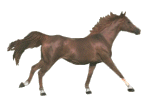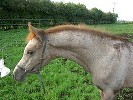| Author |
 Topic Topic  |
|
|
|
Jessica
Silver Member
  
 England England
442 Posts |
 Posted - 15 Sep 2008 : 12:32:10 PM Posted - 15 Sep 2008 : 12:32:10 PM




|
Hi all,
We have approx 6 big old oak trees in our fields. The leaves are still on the tree's at present. I have seen my gelding on a couple of occasions, trying to reach up for leaves. The trees are protected by fencing, so they can't get to them with ease. How much does a horse need to eat to do any damage?? I'm sure the amounts vary.....
Of course when the leaves begin to fall we will collect them but there are always going to be a few falling when Autumn really begins and I can't employ a leaf collector!! Are they any less dangerous when they are dead (therefore falling) or are they still as bad.
|
      |
|
Report to moderator
|
|
|
angel2002
Platinum Member
    

United Kingdom
2502 Posts |
 Posted - 15 Sep 2008 : 12:51:10 PM Posted - 15 Sep 2008 : 12:51:10 PM




|
Hope this info helps :))
Acorns are the fruits (achenes) of different species of oak. Commonly found in England and Northern Europe are: Quercus ilex (holm oak, evergreen oak); Quercus pedunculata (pedunculate oak); Quercus robur (common oak, English oak); Quercus petraea syn sessihflora (sessile oak, durmast oak).
Animals most affected - Cattle, (sheep, horses).
Etiology - Ingestion of extremely large quantities of acorns in autumn, especially during periods of food shortage or drought. Poisoning is extremely frequent and, in certain regions, particularly serious, affecting mainly young animals.
Toxicity - Contains pyrogallic acids, up to 8%, although the amounts vary according to the age of the acorn. Unripe, green acorns contain the highest levels of pyrogallic acids, and certain species of oak (e.g. the pedunculate oak) are more toxic than others. In addition, the age of the tree is significant, with youngest trees having the greatest levels of pyrogallic acids and tannins. Ingestion over a period of 1-4 weeks is necessary before toxic signs become apparent. (Pigs are resistant to pyrogallic and tannic acids.)
Clinical features - Gastrointestinal effects present first (within 7-10 days), and are severe and persistent: anorexia, lack of rumination, abdominal pain; severe constipation, followed by dark foetid diarrhoea, often haemorrhagic, (flatulence, colic and salivation appear less frequently).
General effects - (Equally intense and persistent, but presenting later): cessation of lactation, inappetence, loss of weight and body fat, hypothermia and decubitus.
Urinary effects - (Not persistent, or regular in their presentation) dysuria; excessive urination; haematuria or haemoglobinuria (rare).
Neurological effects - (Infrequent and appearing towards the endstage of poisoning): tremor, grinding of the teeth, ataxia, sluggishness, weakness in the hindquarters.
Haemorrhagic effects (Delayed onset): epistaxis, subcutaneous haemorrhages.
Various effects - ventral oedema, jaw oedema and oedema of limbs (presentation rare and delayed); abortion, patchy sweating (occasional).
A fatal outcome is common (up to 80% of animals with renal signs).
If blood urea levels reach 1-3 g/l, the prognosis is guarded; if uraemia is >3 g/l, a fatal outcome should be anticipated.
Lesions - general congestion of the carcase with an attendant odour of stale urine;
haemorrhagic gastroenteritis with necrosis of the muscular-serous layers; hepatic congestion; occasional degeneration of the liver, with hypertrophy of the gallbladder;
congestion and degeneration of the kidneys, which appear large and pale, with or without petechial haemorrhages; frequently peri-renal oedema; abdominal fat appears yellow in colour, is soft and has an odour of urine; degeneration of muscles with suffusions of blood.
Treatment - No antidote. Symptomatic and supportive care only: gastrointestinal demulcents, liquid paraffin, mild oleaginous or mucilagenous laxatives (infusion of linseed); hepatic protective agents; myocardial stimulants; iv infusions of serum with added glucose and bicarbonates.
Recommendations - To avoid or prevent poisoning: prune back oaks surrounding grazing areas; prevent access to acorns; isolate animals with sigus of a toxic syndrome indicative of acorn ingestion.
My advice is to make sure that you cut the tree back or move your fencing to stop your horse being able to eat any part of the tree and/or acorns. I would also say that acorn poisoning is probably more of a problem with horses/ponies that are on starvation padocks with nothing else to eat.
Better safe than sorry though!
|
Angel
Passion Arabians
    |
Report to Moderator  |
|
|
Jessica
Silver Member
  

England
442 Posts |
 Posted - 15 Sep 2008 : 1:05:19 PM Posted - 15 Sep 2008 : 1:05:19 PM




|
Hi there, thanks for that info.
The tree's are really old (so reading the above, that's a plus side) they are also 'protected' so we are not allowed to prune them. Grrr
I think we will have to extend the fencing. The grazing is great at present and the leaves and the acorns are still very much ON the tree's so we have a little time to implement our plans. (Or go ahead and employ an acorn collector of course!!)
Very worrying read though, but thanks for your response.
|
      |
Report to Moderator  |
|
|
ashabarab
Gold Member
   

England
1378 Posts |
 Posted - 15 Sep 2008 : 4:04:49 PM Posted - 15 Sep 2008 : 4:04:49 PM




|
put up tempory fencing...then rake up the acorns and you can take the fencing down and graze again later
had to do that at one place l was at...we also had loads of chestnuts which the horses munched their way through after they had worked out how to remove the *****ly bits...they got very well covered [fat] as they are high in protein [did ask the vet first]
ash
ps l see admin is working over time..the shells are very hard and have long spines! can be painfull if you pick them up....very funny to watch the horses get them free...takes a while..kept them ocupied for hours! |
Edited by - ashabarab on 15 Sep 2008 4:27:01 PM |
Report to Moderator  |
|
|
Jessica
Silver Member
  

England
442 Posts |
 Posted - 15 Sep 2008 : 4:09:20 PM Posted - 15 Sep 2008 : 4:09:20 PM




|
Thanks Ash.
Thats what we're going to have to do, alongside regular acorn collecting and raking. Gosh, if only acorn pie was nice!!
|
      |
Report to Moderator  |
|
|
Jessica
Silver Member
  

England
442 Posts |
 Posted - 15 Sep 2008 : 4:32:30 PM Posted - 15 Sep 2008 : 4:32:30 PM




|
They don't miss a beat!!
Well i'd swap our Oak Trees for your Chestnut Trees any day! They sound like a lot more fun! |
      |
Report to Moderator  |
|
|
Sheena
Platinum Member
    

United Kingdom
1810 Posts |
 Posted - 16 Sep 2008 : 3:56:53 PM Posted - 16 Sep 2008 : 3:56:53 PM




|
I have a huge old oak which spans two of my paddocks, to be honest (and touching wood) it's generally used as a shelter and scratch post. I do clear as many acorns as possible, but they never seem bothered with them anyway as good grazing and feed. They will pick the odd leaf but again not that bothered, the thorny bushes are a favourite. I do think it is more common for horses with no grazing etc to go for acorns, most horses I think so know what to avoid - ie I don't think you find that many horses would munch on ragwort by choice unless literally nothing to eat.
I don't like to take the chance so rag, acorns etc are banished and burnt! |
Alicia
     
|
Report to Moderator  |
|
|
barbara.gregory
Platinum Member
    
United Kingdom
4531 Posts |
 Posted - 16 Sep 2008 : 7:59:13 PM Posted - 16 Sep 2008 : 7:59:13 PM




|
I have a huge, very old oak tree in one of my paddocks and the horses love to shelter under it. I have never had any problems from it, don't worry unless the horses are really hungry they are unlikely to eat the acorns. My old boy is 31 so hasn't done him much harm!
Barbara |
    |
Report to Moderator  |
|
|
Zenitha
Gold Member
   

England
1078 Posts |
 Posted - 16 Sep 2008 : 8:27:30 PM Posted - 16 Sep 2008 : 8:27:30 PM




|
Oh dear now I'm really worried.
The field I wanted to use this Winter has lots of big oak trees - the horses do tend to grab a mouthful of leaves as they walk by. Obviously I would pick the acorns up but they offer such brilliant shelter and it being a concervation area I can't cut them back  . .
Just how poisonous are the leaves and how much do they have to eat to become ill (NB the horses always have access to hay). |
|
Report to Moderator  |
|
|
barbara.gregory
Platinum Member
    
United Kingdom
4531 Posts |
 Posted - 17 Sep 2008 : 11:38:40 AM Posted - 17 Sep 2008 : 11:38:40 AM




|
If they have access to hay most of the time they should be fine. Mine have been in with the oak tree for 20 years (those that are old enough!) and I have never had a problem. There are hedges round the field with better things to eat and they are in at night, but only have a pile of hay each when they go out in the morning, not all day access.
Barbara |
    |
Report to Moderator  |
|
|
Caro23
Gold Member
   

United Kingdom
617 Posts |
 Posted - 17 Sep 2008 : 2:00:09 PM Posted - 17 Sep 2008 : 2:00:09 PM




|
| Hi - please be careful with acorns. Dulcie had acorn poisoning a couple of years ago and I thought she was going to die. Luckily the vet treated her very quickly and having laid with her head in my arms all day she got up and made a quick recovery. The vet said horses can eat them for years with no ill effect and then suddenly be poisoned and it can be fatal. I now tape off the lovely oak trees when the acorns drop to be safe. |
Caro
     |
Report to Moderator  |
|
|
Caro23
Gold Member
   

United Kingdom
617 Posts |
 Posted - 17 Sep 2008 : 2:02:38 PM Posted - 17 Sep 2008 : 2:02:38 PM




|
| added to say - there was loads of grass and she was definitely not hungry just took a fancy to them! |
Caro
     |
Report to Moderator  |
|
|
Eeyore
Gold Member
   

1181 Posts |
 Posted - 17 Sep 2008 : 3:42:49 PM Posted - 17 Sep 2008 : 3:42:49 PM




|
The problem is once they have a taste for acorns they become 'addicted'. My old TB nearly killed herself eating acorns and I had to watch her like a hawk. She obviously loved the taste and would go searching for acorns, even digging up buried ones with her hooves. I have a really big oak tree in one field and had to electric fence it off every autumn and try to collect up all the acorns.
Luckily (touching wood) neither of my arabs have bothered but I still fence it off when the acorns are falling, just in case.
|
HelÚna
   |
Report to Moderator  |
|
|
mouse
Silver Member
  

United Kingdom
309 Posts |
 Posted - 18 Sep 2008 : 1:05:02 PM Posted - 18 Sep 2008 : 1:05:02 PM




|
| I fence of my oak trees. My mare has lots of grass but loves to eat oak leaves and acorns and now so does her foal given half a chance! |
    
South Norfolk/Suffolk border |
Report to Moderator  |
|
|
Fahren
Junior Member


Wales
30 Posts |
 Posted - 20 Sep 2008 : 1:30:09 PM Posted - 20 Sep 2008 : 1:30:09 PM




|
I bought a high powered blower, I blow all the acorns into the hedgerow, together with as many leaves as possible.
They do pick the leaves, but not a great amount and the acorns worried me the most. |
Report to Moderator  |
|
| |
 Topic Topic  |
|

